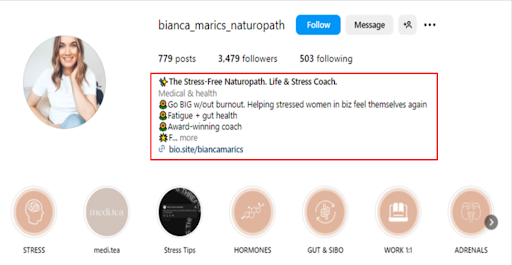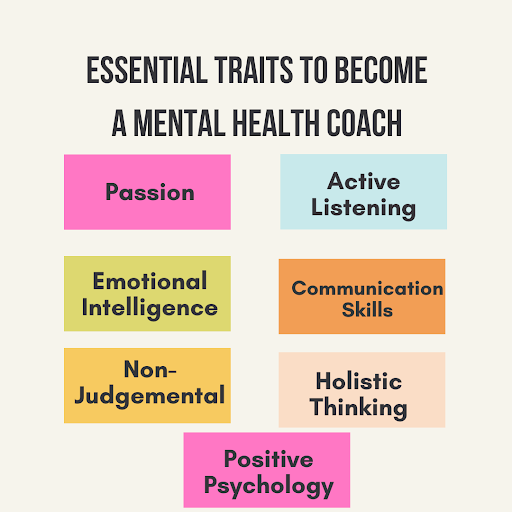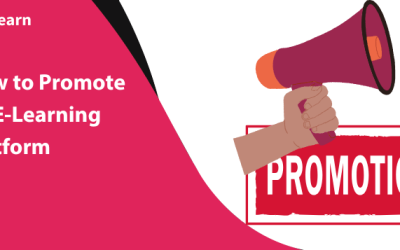How to Become a Mental Health Coach: A Step-by-Step Guide
Do you have the passion to guide people towards mental well-being? Have you endured a workplace burnout or conquered a toxic habit? Well, if you have any of the above and the desired credentials, you could start a mental health coaching business!
Although the stigma around mental health has reduced, there are misconceptions about becoming a mental health coach. In this blog, you’ll learn how to become a mental health coach. From understanding their role and exploring reasons to unleashing a complete roadmap to becoming one, we have got you covered.
So, are you ready to empower others towards a transformative journey of holistic well-being?
What Does a Mental Health Coach Do?
Before discussing the comprehensive guide on how to become a mental health coach, let’s understand the role of mental health coach.
A mental health coach is a dedicated professional who works with clients to improve their mental health and well-being. They help them cope with stress, develop self-awareness, and build resilience.
Understanding the Role
Unlike other health professionals who help with clinical issues, a mental health coach emphasizes overall personal growth and development.
Here’s a list of typical duties and responsibilities of a mental health coach:
- Ask questions, reflect on different aspects, and change the perspective of life.
- Shift deeply ingrained beliefs and mindset
- Develop stress-coping strategies and skills to manage emotions and life
- Identify and embrace weaknesses and strengths
- Set achieved goals to facilitate behavior change
- Enhance communication and relationship skills
- Reinforce learning through personalized assignments and sessions.
Differences between Mental Health Coaches and Therapists
While people often use the terms “mental health coach” and “therapist” interchangeably, they are different. Both are dedicated professionals who strive to improve clients’ overall mental well-being.
Let’s have a quick overview of how these two professions differ:
| Key Aspect | Mental Health Coach | Therapists |
| Background | Certification from accredited institutes like International Coaching Federation (ICF).
Mental health coaches don’t necessarily demand a formal education or licensing. |
Master’s degree in psychology or related degree. State license for clinical practice and fixed hours of supervised clinical practice is must. |
| Diagnosis & Medication | Don’t diagnose mental illness or prescribe medications. | Have clinical expertise to diagnose and treat mental illnesses with medications. |
| Approach | Uses goal-setting, stress-coping mechanism, active listening, open-ended questions, tools to help clients. | Uses clinical treatment approaches like Cognitive Behavioural Therapy (CBT), behavior and humanistics therapy. |
| Focuses | Focuses on present and future to encourage a behavior change | Navigates past and present situations to treat the problem. |
| Areas of Specialization | Wellness and mental fitness coach, stress management coach, grief coaches, etc. | CBT, talk therapy, treating depression, anxiety disorders. |
Why Become a Mental Health Coach?
Now that you are acquainted with the role of a mental health coach, let’s explore the reasons for becoming one!
Here are the benefits of becoming a mental health coach:
High Demand
Increasing awareness and reduced stigma around mental health illnesses are primary catalysts for increasing demand for mental health coaches. People consult mental health coaches to manage stress and anxiety-related issues and overcome negative behavioral patterns.
Impact on Individuals’ Mental Well-being
Mental health coaching offers a great opportunity if you’re passionate enough to make a positive difference in others’ lives! It helps people navigate mental and emotional challenges and improve your client’s life.
Personal Fulfillment and Growth in the Profession
Gaining more insights into emotional intelligence, human behavior and psychology will help you grow personally and professionally.
Diverse Career Opportunities
From private practices and corporate settings to wellness centers, you can work as a mental health coach in a whole lot of settings.
Flexibility
We have changed our priorities from work-life balance to work-life harmony. Being a mental health coach offers more flexibility, thanks to consistent schedules and sessions that easily fit into your lifestyle.
How to Become a Mental Health Coach: 7-Step Detailed Roadmap
So, how do you become a mental health coach?
If you are interested in pursuing a career in mental health coaching, this roadmap will help you find your purpose!

Step #1: Earn an Associate Degree
The first step is to get trained and equip yourself with a credible educational background to get started as a mental health coach. While you don’t need a specific degree, having a foundation in human behavior and psychology could help. A relevant degree in psychology, mental health, counseling, social work, or a related field provides a basic foundation for becoming a mental health coach.
A deep passion for helping others navigate their life challenges could motivate you.
Step #2: Get Accredited Certification
Along with an associate degree, a certification can boost your credentials. Enrolling in a certification program equips you with coaching techniques, ethical guidelines, positive psychological interventions, and more.
Once you’re certified, clients consider you as a credible coach and are assured to seek psychological help. Lastly, a certification offers an edge over other coaches in your niche.
Step #3: Gain Practical Experience
“Practice makes perfect!” This phrase holds true for the coaching realm as well! Starting a coaching business could be overwhelming, considering that you’re dealing with real-world clients. Moreover, you would be left with fewer clients while transitioning from learning to practice.
Going pro bono equips you with the necessary experience and knowledge to start with the actual practice. You can offer coaching sessions for free or for a low fee.
You can gain pro bono coaching experience by practicing at:
- Volunteering or interning at community centers, schools, mental health organizations, etc.
- Host free workshops or webinars
- Offer free coaching sessions on LinkedIn or Facebook groups
- Join a coaching project like ICF that expects fixed paid or unpaid coaching hours.
- Get involved with professional networks like Taproot Foundation and Coaching Across Continents.
Pro bono sessions help you improve your coaching skills, gain confidence, create a blueprint for your coaching program, and gather testimonials and feedback.
Step #4: Specialize in a Profitable Niche
So, now you have the credentials and practical experience to start your coaching business.
But how to stand out from the crowd?
That’s when a profitable niche could be your USP to attract a specific audience. A niche means what and who you want to build your coaching program around.
“Riches are in the niches.” Your niche helps to target a specific audience, establish domain authority, and charge higher coaching prices.
Pick a niche, evaluating the following aspects:
- Your knowledge, experience and expertise
- Passion and skills
- An existing problem in your niche
- Profitability of your niche
Here are a few profitable niches to become a mental health coach:
- Helping to conquer toxic habits or negative behavior patterns
- Trauma healer
- Treating Emetophobia sufferers
- Help to improve relationships
- Stress, burnout & wellness coach
- Anxiety coach for teens
- Mental resilience coach
Further, you can niche down by targeting a specific age group or gender or using a unique healing mechanism like naturopathy or meditation.

Step #5: Craft an Irresistible Coaching Offer
Now that you have picked your niche, go ahead and craft your first coaching package!
People often overthink to perfect the details of their coaching offer. But this only delays the process of getting clients!
Here’s a quick 4-step process to build your coaching offer:
1. Research your Target Audience
Your target audience are the end-users of your coaching service. So, offer your clients what they need. Perhaps, your clients might be looking for stress coping mechanisms. Understand the goals, challenges and pain points of your clients. Maybe they are looking for morning routines to amplify their energy.
2. The Benefit vs. Feature Appeal
Trust me, your coaches are seeking outcomes rather than the coaching process. Typically, new coaches sell their coaching package features instead of results. Sell the transformation you are going to deliver! This will ultimately persuade the clients to make the call!
3. Structure Your Coaching Program
Start with a basic framework of your coaching package.
Ask the following questions:
- What milestones and steps are you going to focus on?
- How frequent would the sessions be?
- How long would it take to achieve the result?
For instance, you can start by setting goals, then move on to check-ins and the final evaluation. Use our free coaching template to simplify the process.
This way, you can lay the blueprint for your coaching program!
💡Important: To structure your coaching better, read our essential checklist to starting coaching program
4. Pricing
Charging the right price is a win-win situation for you and your clients! Of course, you need to find a sweet spot and avoid overcharging or undercharging.
You can charge as a package or follow a retainer model. A good strategy is to offer a 3-month coaching package for $1,500. Yes, it’s common to face imposter syndrome while starting, but remember, you can always tweak your prices!
Lastly, add some extras for ongoing support, such as reading lists, workbooks, guided meditations, or access to a private community or group. You can even explore new hybrid pricing models!
For instance,

Step # 6: Find Your First Paying Client
Your first coaching program is all set and ready to take ground!
But how do you find your first paying coaching clients?
Let me share some advice before we knock on all the doors to get conversions!
Work on your mindset! Stop negative trails of thoughts like “Nobody would pay for my coaching service.” Instead, channel affirmations like “My next client is out there waiting to find me!”
Define a goal, such as a fixed number of clients to target next month. Reach out to, say,10 prospective clients in your network who would benefit from your service. You can even target leads in your community and social network.
Offer a sample coaching call and seek their feedback. Next, if they turn out to be paying clients, you can invite them to actual calls.
Fuel your marketing efforts with this insightful video by Rich Litvin
Step # 7: Promote Your Mental Health Coaching Program
You have completed coaching your initial set of paying clients! So far, you’re doing well!
But you can’t stop your marketing efforts to a few clients!
Leverage these strategies to boost your marketing efforts:
- Run Facebook Ads targeting a specific audience and boost your traffic.
- Join Facebook groups, participate in discussions and subtly promote your coaching program.
- Reach out to local physicians and leverage their referrals to get new clients.
- Share valuable and insightful tips & techniques on social media handles like Instagram.
- Optimize your website and coaching program for top keywords like “certified mental health coach.”
- Create YouTube videos to create mental health awareness and trending niche topics.
- Build an email list and share newsletters, blog links, and promotional offers.
Well, that’s the end of our step-to-step process on how to become a mental health coach. But, we have a few more sections to gain an extra edge over your competitors.
💡Important: If you are working to be a better coach, here’s our blog on how to improve your coaching skills.
What are the Top Certifications for Mental Health Coaches?
Which is the best certification for becoming a mental health coach?
Here’s the list of best mental health certifications to make a difference in your coaching business:
iNLP Center Mental Health Coach Certification Training
iNLP is a globally renowned life coaching and NLP training center. iNLP Center Mental Health Coach Certification courses blend inner dynamics psychology, advanced life coaching, and NLP coaching tools to help deliver expected client results. The program is accredited by ICF, the International NLP Association and BCC.
Course Length: 10-week course (Weekly 120-minute live Zoom classes)
Price: $7900
HeadSpace Training Institute
The popular meditation and mindfulness app prepares the students to earn a Certificate in Mental Health Coaching (CMHC). The Headspace mental coaching program is approved by the National Board for Health and Wellness Coaching (NBHWC). It covers evidence-based practices in health and wellness coaching. Candidates enrolling in this program qualify to enroll for the HWC Certifying Examination and can become a certified NBC-HWC coach.
Course Length: Six months (20-weekly live sessions)
Price: $5,995
Light University – School of Mental Health Coaching
The last course in the list blends Christian ideas with coaching principles. The coaching program includes three integrated courses: a basic foundation, a skills program, and a course on behavioral disorders. It covers mental illnesses like trauma and abuse, addiction, panic disorder, stress and anxiety, etc.
Course Length: 40-hour training program
Price: $2400 (full scholarship)
What are the Traits to Become a Mental Health Coach?
A mental health coach helps you grow mentally and emotionally. So, if you wish to be a successful coach, ensure you have a specific set of skills to guide your clients through life challenges.

Passion
Mental health coaches help people build mental resilience and improve their lives. So, as a coach, you need to have an intrinsic passion for helping people and solving their problems.
Active Listening
Active listening is to listen beyond words and understand your clients’ thoughts and feelings. You must attune to the voice or tone, look for non-verbal cues, and acknowledge with expressions and reactions.
💡Important: Here’s an interesting read by Robin Abrahams and Boris Groysberg to be an active listener:
How to Become a Better Listener
Emotional Intelligence
Emotional intelligence is a vital requirement for improving your relationship with your clients. It involves heightened self-awareness, empathy and rapport-building, which helps you perform better as a coach.
Excellent Communication Skills
Coaches are effective communicators. Effective communication is a key skill for motivating, providing feedback, acknowledging clients’ challenges, and fostering deep relationships.
Non-Judgemental
Clients share their personal and professional experiences and challenges with coaches. As a coach, you need to set aside your prejudices, opinions, and beliefs to be present with the clients rather than being stuck with one’s opinions.
Holistic Thinking
Holistic thinking, or “big-picture thinking,” is a 360-degree view of a specific idea or aspect. Great coaches value the interconnectedness of different aspects of life and value them as a whole being. This helps them offer fresh perspectives and resonate better with clients.
Positive Psychology
Building resilience, practicing optimism, and evaluating strengths can help coaches support clients in achieving their goals. This helps coaches channel clients’ strengths and maximize their potential.
Besides the above traits, mental health coaches also need knowledge of cognitive behavioral therapy.
🔥 Note: Guidelines for Mental Health Coaches
Dealing with mental health is a sensitive issue. People deal with different mental illnesses. Some are severe and need the timely intervention of professional therapists.
Here’s a list of mental illnesses not recommended for mental health coaching:
- Post-traumatic stress disorder (PTSD)
- Diagnosis of trauma
- Depression
- Substance misuse
- Mental coaching for children
- Life-threatening conditions like suicidal attempts
- Behavioral disorders like borderline personality disorder(BCD), obsessive-compulsive disorder (OCD) or other disorders that need psychiatric treatment.
In such cases, coaches can refer to counselors, therapists, or doctors. The earliest sign to detect such situations is when there is a need to change the coaching approach.
Where to Work as a Mental Health Coach?
With the buzzing health wellness wave, the role of mental health coaches is evolving more than ever.
Mental health coaches can work in diverse settings, including:
-
Private Practice
Independent practice is one of the most common ways to function as a mental health coach. It typically offers coaching through virtual or in-person sessions based on the client’s preferences and goals. The advantage of running a private practice is the flexibility to decide your session schedules, pricing and clients.
-
Mental Health Clinics or Wellness Centers
Many wellness centers and clinics adopt a holistic approach and offer mental health coaching consultations.
-
Corporate Mental Health Programs
Nowadays, many corporations offer employee assistance programs to combat the evolving workforce needs and pressure. Here, coaches focus on work-life balance, stress management, etc.
-
Online Health & TeleHealth Platforms
Wellness platforms like Headspace, BetterHelp, and Ginger include remote mental health coaching.
How Much Can You Charge as a Mental Health Coach?
Mental health coaching is experiencing a surge in demand. Today, mental health coaches charge between $75 and $250. Package prices range from $1,200 to $2,400 per package.
According to Glassdoor, mental health coaches earn $60,882 yearly.
As per Salary.com, the average salary of mental health coaches in the United States is around $34,575 to $43,567 per year. Coaching experience, services, location and credentials influence their average earnings.
Are You Ready to Become a Mental Health Coach?
Mental health coaching is fast evolving as a demanding field where you can easily make your career. After reading this blog, you might have gained insights on how to become a mental health coach. Now, you are well equipped to make your first significant steps towards a successful career in the mental health coaching industry.
There’s no golden rulebook for establishing your coaching business. You can decide where to start, what to offer, and how to price your services. So, are you ready to establish your thriving business?
FAQ-Related to How to Become a Mental Health Coach
1. How do you become a mental health coach?
Earn your associate degree, get relevant certifications, gain practical experience, niche down, build your coaching program, get your first paying clients and market your coaching services to become a mental health coach.
2. How much do mental health coaches make?
As per Glassdoor, mental health coaches earn an average of $60,882 yearly. Factors like expertise, coaching services, location and certifications affect how much you can earn as a mental health coach.
3. Are mental health coaches the same as therapists?
No, mental health coaches and therapists are technically different. While therapists treat mental health illnesses with medications, mental health coaches focus on building resilience and improving the client’s overall well-being.
4. What do mental health coaches do?
Mental health coaches use motivational techniques and goal-setting to improve clients’ mental and emotional well-being. They help to shift mindsets, enhance relationship skills, and provide actionable steps to bring about behavioral changes.





